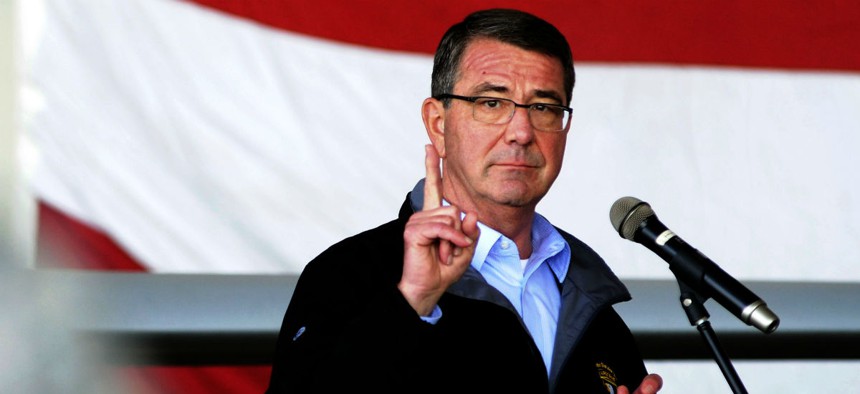Ash Carter used a personal email account to conduct at least part of his official business as defense secretary, the Pentagon has acknowledged, a practice he continued at least two months after it was revealed in March that Hillary Clinton, the Democratic presidential candidate, used a personal account to conduct official business while secretary of state.
The New York Times, which first reported the story, based its account on officials at the White House and Defense Department, as well as copies of Carter’s emails that it obtained.
It is not clear when Mr. Carter stopped using the account. But an administration official said that when the White House chief of staff, Denis R. McDonough, learned about Mr. Carter’s email practices in May, Mr. McDonough directed the White House Counsel’s Office to contact the Defense Department to ask why Mr. Carter was relying on the personal account.
Mr. McDonough wanted to ensure that Mr. Carter was following all federal laws and regulations governing email use, the official said.
Speaking to CBS News in Ebril, Iraq, Carter said he continued to send work emails from his iPhone “until a few months ago” despite being “warned by lots of people along the way” to be careful with his communications. He said he rarely uses email, and never sent anything classified via his personal account. He did, however, “occasionally” send “administrative" emails to his “immediate staff,” Carter told CBS.
“It's a mistake, and it's entirely my own,” he said, adding, “I stopped” as soon as he realized the practice was against policy.
Peter Cook, the Pentagon spokesman, confirmed the newspaper’s account, saying Carter’s actions were a “mistake” and the defense secretary had stopped the use of the private account. He added that Carter used the account primarily to correspond with friends and family.
Any email related to work received on this personal account, such as an invitation to speak at an event or an administrative issue, is copied or forwarded to his official account so it can be preserved as a federal record as appropriate.
Secretary Carter strongly prefers to conduct communications on the phone or in person, and like many of his predecessors rarely uses email for official government business. The secretary does not directly email anyone within the department or the U.S. government except a very small group of senior advisers, usually his chief of staff.
Cook did not say whether Carter’s action violated a Defense Department’s policy, adopted in 2012, that bars all employees from using personal email accounts to conduct official business. Additionally, federal officials are barred from sending or receiving official email on their personal accounts—unless the correspondence is copied into their official accounts or forwarded to them within 20 days.
It isn’t clear how many emails Carter sent or received on his personal account, but he is the second high-level Cabinet-level official in the Obama administration to follow the practice. The official who has received scrutiny prior to this is Clinton, the former secretary of state who is now seeking the Democratic nomination for the presidency.
Clinton has said she sent and received about 30,000 emails from her personal account, and the State Department has released some of those emails to the public. But as my colleague David Graham, who has been following the Clinton scandals closely, notes:
The rules governing use of personal emails are murky, and Clinton aides insist she followed the rules. There’s no dispositive evidence otherwise so far. The greater political problem for Clinton is it raises questions about how she selected the emails she turned over and what was in the ones she deleted. The FBI has reportedly managed to recover some of the deleted correspondence. Could the server have been hacked? Some of the emails she received on her personal account are marked sensitive. Plus there’s a entirely different set of questions about Clinton’s State Department emails. The FBI is investigating the security of the server as well as the safety of a thumb drive belonging to her lawyer that contains copies of her emails. And the AP reports that the setup may have made the server vulnerable to hacking. Given theshabby state of State Department cybersecurity, she might not have been any better off using the official system.
Carter’s emails obtained by the Times, through a Freedom of Information Act request, include 72 work-related emails he sent or received from his personal email account in the month of April. The Times reported Carter was emailing Eric Fanning, his chief of staff at the time, as well as other senior aides on their government email addresses.
The correspondence, the Times said, included discussions on legislation, TV appearances, and hotel bills.







